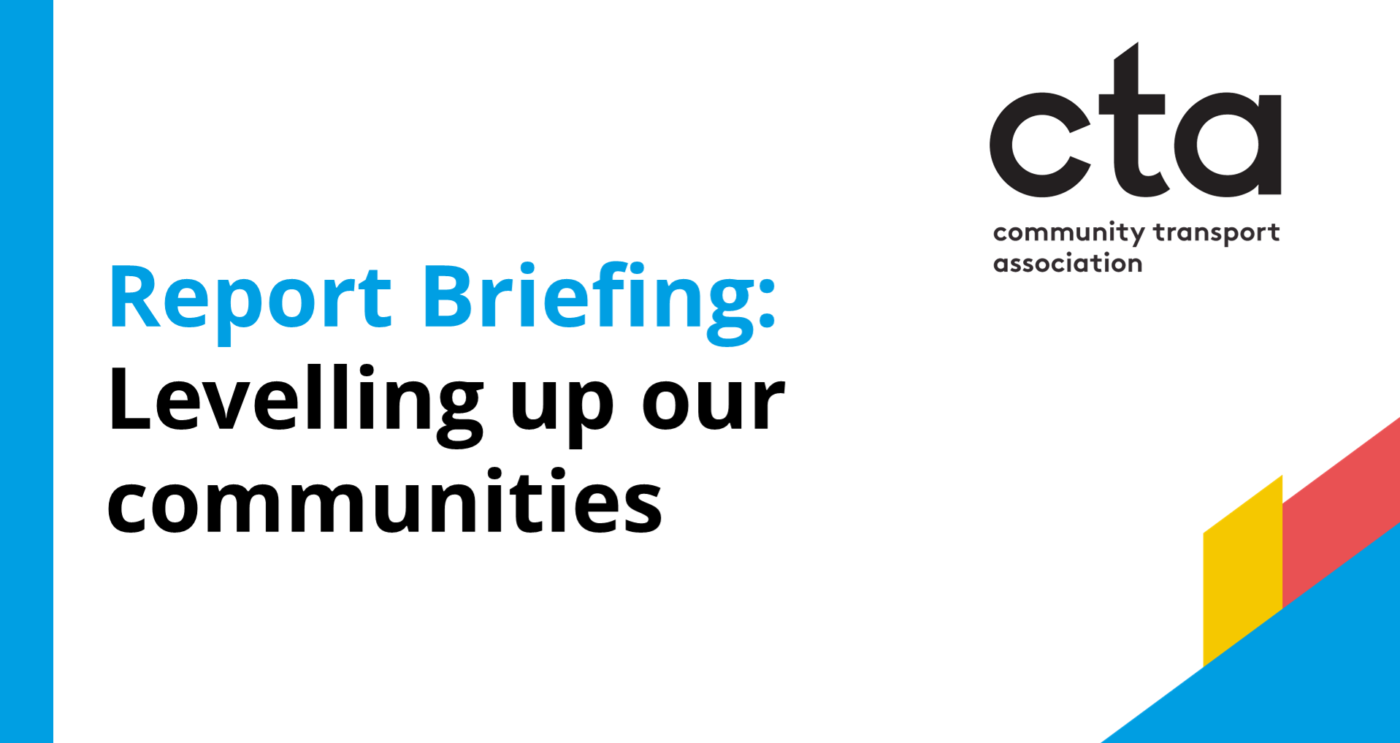-

Report Briefing: Levelling Up Our Communities – Proposals for a New Social Covenant
-
13th October 2020
-
-
by Bill Freeman
Chief Executive
The most effective responses to helping communities respond to the coronavirus pandemic have largely been local and community led. This was acknowledged in a report published in September 2020 by Danny Kruger MP called Levelling Up Our Communities: Proposals for a New Social Covenant. In June the Prime Minister asked him for proposals to sustain the community spirit which had been seen during the lockdown. His report sets out a vision for “a more local, more human, less bureaucratic, less centralised society in which people are supported and empowered to play an active role in their neighbourhoods”.
Like most reports it was greeted with a mix of cautious welcoming and waiting to see the detail or how much gets adopted. We feel that way too. It does, however, contain important proposals that could reshape the context in which community transport works if enacted:
- A volunteer passport system, which would let individuals move between volunteering roles and would encourage work in local communities.
- Reforms to commissioning to make public spending create social value leading to a more collaborative and trusting model of service design and commissioning.
- A ‘Community Power Act’ to give local people power over the design and delivery of public services.
- A new £500m Community Recovery Fund to help civil society during the current crisis, financed through the defunct National Fund.
- A new £2bn endowment, the Levelling Up Communities Fund, for investment in long-term, community-led transformation in left-behind areas, financed through dormant insurance accounts.
In terms of what this means for community transport in future policy and practice, here are some things we thought were worth exploring.
Support for Volunteering
Support with recruiting and retaining volunteers is something a good number of members tell us they want help with. We have a good discussion lined up on this very topic as part our series of online events, if you’re interested. The report proposes a Volunteer Passport to make it easier to access and share willing volunteers which has some appeal. The proposal to build a National Volunteer Reserve evolved from the NHS Volunteer Responder programme may help, but efforts to strengthen support for volunteering must not forget the vital role of local volunteering support infrastructure, which already has the networks and know-how to get things done in their communities in the way an app or a national call centre never could.
Commissioning for social value / Community Power Act
The report rightly calls out the tendency in commissioning to award contracts to large corporate providers and how the need for a plural supply chain with opportunities for civil society organisations rarely gets more than lip service. Citing the example of community-led transport schemes the report says they are “generally seen as peripheral, eccentric exceptions to the general rule, which is based on large public and private sector organisations achieving accountability and economies of scale. In fact community-led schemes can achieve greater value for money and more direct accountability to local people than the big players.”
We may take exception to being called eccentric, but we know community transport is overlooked in some types of transport provision because the systems don’t recognise and encourage small, local and independent organisations or social value.
If the proposed shake-up of commissioning to make public spending create social value does lead to a more collaborative and trusting model of service design and commissioning, then we can see a clearer path for greater recognition and involvement for community transport, especially in things like patient transport. The proposed Community Power Act, through which community groups can challenge for a role in the design and delivery of public services, would be an important tool for advancing this agenda.
New funding
The pandemic has created more financial stress for charities and community groups facing loss of income, especially from user contributions (e.g. fares and group hire fees), donations and community fundraising
We know access to good sustainable financial support is a worry to so many CTA members and a big priority for CTA to address. We have three funding application write-shops for members coming up as part of this and CTA members can access our suite of resources on accessing funding here.
We therefore welcome the proposal of a new £500m community recovery fund and a longer term endowed fund that would be delivered through local trusts and community foundations. Our assessment of funding during the pandemic has shown members have done better at accessing local more than national funds to support coronavirus responses and local community foundations have done a fantastic job in supporting this.
Other organisation’s responses to Levelling Up Our Communities: Proposals for a New Social Covenant
Other interesting reports about community responses to coronavirus
Locality – We were built for this (June 2020)
New Local Government Network – Communities vs Coronavirus: The Rise of Mutual Aid (July 2020)
Plunkett Foundation – Plunkett’s Vision for a Covid-19 Rural Recovery (July 2020)
Local Trust – Stronger than anyone thought: Communities responding to COVID-19 (September 2020)
-
-
- About CTA
- /
- CTA Membership
- /
- CTWeek24
- /
- Policy & Research
- CommunitySolutions: A Manifesto for the Next UK General Election
- Our Campaigning Guide for Community Transport
- Our Policy Work
- Join Our Mapping England Passenger Survey
- Aneurin Bevan Transport to Health
- Climate Action in Scotland
- conneCTing England Programme
- Mapping Scotland Project
- Mapping Wales
- Mapping England
- Tackling Loneliness in England
- Healthy Communities in Scotland
- /
- Advice & Support
- /
- Training
- /
- Events
- /
